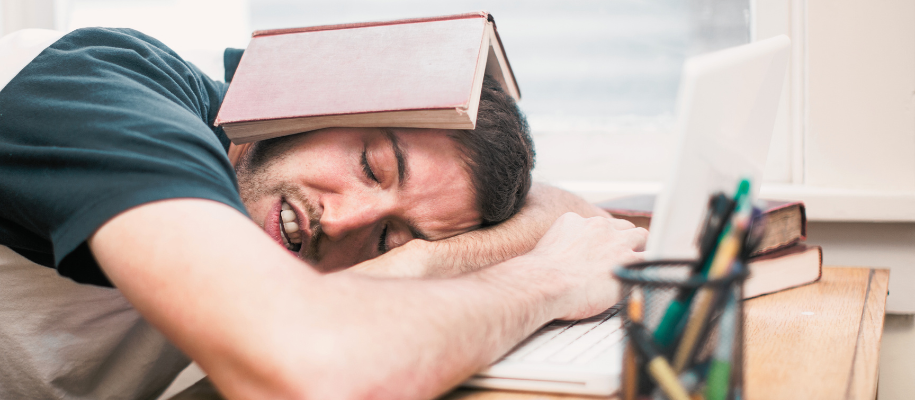If you want to excel in college, one thing you should make a top priority is your quality of sleep. A 2019 study at MIT found that there’s a strong relationship between students getting good grades and how much they sleep. Moreover, aspects such as bedtime routines, sleep quantity, and consistency of sleep habits make a huge difference. For instance, one finding that surprised researchers was that students who slept after 2:00 am tended to perform worse on tests even if they got a good amount of total sleep. The researchers pointed to the importance of making both sleep quantity and sleep quality a priority through the adoption of healthy “sleep hygiene” practices. Let’s explore what healthy sleep hygiene means and how you can implement it into your college life.
What is good sleep quantity and quality?
The National Sleep Foundation recommends that adults get between seven and nine hours of sleep a night to meet sleep quantity ideals. Sleep quality is a little more complex, since you could be getting ample hours of rest yet wake up feeling tired and fatigued—indicating a quality problem rather than a quantity one. There are three main factors involved in improving sleep quality: falling asleep within half an hour of getting in bed, waking up no more than once after falling asleep, and being awake in bed for no longer than a total of 20 minutes when you do wake up in the middle of the night. To achieve the sleep quantity and quality you need, the adoption of specific sleep hygiene practices is vital.
Related: How Important Is Sleep to Academic Success?
What does good sleep hygiene involve?
Sleep hygiene is defined as a series of habits that promote good sleep. These can include sleeping in a completely dark, quiet room; limiting daytime naps to half an hour; avoiding stimulating beverages like coffee or soda after 2:00 pm; avoiding heavy, fatty meals in the evening; and ensuring you get enough sunlight during the day. If you live in a dorm where parties are a regular occurrence, consider sharing an apartment off campus in a quiet area or changing dorms next semester. Additionally, some people find that taking a warm bath, using essential oils like lavender, or practicing progressive muscle relaxation in bed can help promote sleep health. Sleep hygiene involves more than embracing general healthy habits, however. It also involves proactively taking care of your mental health.
Sleep and anxiety
Common mental disorders like anxiety and depression can interfere with your sleep, as can general anxiety about exams or other student stressors. Even being anxious about falling asleep can, in itself, keep you up at night. To reduce stress and worry at night, you need to work actively during the day to reduce levels of the stress hormone cortisol. Proven methods to do this include exercising daily and taking part in holistic activities such as yoga, mindful meditation, and Tai Chi. Additionally, controlled breathing—inhaling air into the lungs for a number of seconds and exhaling for a slightly longer amount of time—is very helpful at lowering the heart rate in times of stress. You can even use apps like Calm or Headspace for various exercises involving breathing and meditation.
Related: Alleviating Stress and Anxiety: The Best Advice From Real Students
Studies on meditation
There are many different kinds of meditation, so you need to find which one works best for you. Do some research and check out the many studies on how meditation can help students. One study by researchers at the Wake Forest Baptist Medical Center found that meditation can help medical students prevent burnout. Another recent study undertaken at the University of Bristol found that stress-related mental issues in college students could be prevented through meditation. The good news is that you don’t need to be a pro at these holistic activities to reap their benefits; in just a couple of hours, you can start reaping similar benefits as people who have been practicing meditation for much longer.
Cognitive behavioral therapy
If you try natural methods to improve your sleep hygiene, they don’t work, and your sleep needs are getting dire, consider seeing a therapist. Cognitive behavioral therapy has been found to help people with serious stress-related sleep problems. It will highlight how small behavioral changes can significantly improve your relationship with sleep. You might also consider seeing a sleep therapist to rule out any other problems like sleep apnea, which can seriously hamper your sleep quality and can also increase the likelihood of developing other diseases.
Related: 5 Quick and Easy Tips to Sleep Better in College
Many college students find it hard to sleep because of various reasons like social activity on campus or the stress of being away from family and friends. If you’re new to a dorm or shared living situation, just try your best to make good sleep hygiene a priority by creating a comfortable, quiet, and dark sleeping space. Eating healthily, exercising, and embracing the stress-busting effects of meditation and other holistic activities can also ensure that stress doesn’t keep you awake all night.
For more advice on avoiding stress and living your best college life, check out our Student Life section.







